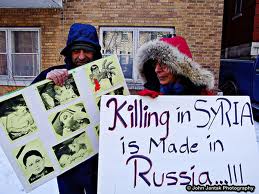 A DEFIANT Moscow has announced that a cargo ship would deliver weapons to Syria under the Russian national flag despite being forced to abandon its voyage when Britain withdrew insurance cover.
A DEFIANT Moscow has announced that a cargo ship would deliver weapons to Syria under the Russian national flag despite being forced to abandon its voyage when Britain withdrew insurance cover.
The MV Alaed turned around in the North Sea, about 80 kilometres from the Scottish coast, after its London-based insurer withdrew third-party liability cover. The British authorities forced this move, suspecting that the ship was taking arms to Syrian President Bashar al-Assad’s regime.
The Russian Foreign Ministry confirmed yesterday that the ship was carrying three Mi-25 attack helicopters, sold to Syria 20 years ago but upgraded under a contract with Syria’s armed forces. The vessel, bound for the port of Murmansk, will be reflagged under Russian colours and then sent to Syria to complete the delivery. ”[The helicopters] are the property of the Syrian side and must be returned to the Syrian Arab Republic after repairs,” said a Foreign Ministry spokesman in Moscow.
At least 114 people were reported killed in Syria on Thursday, Red Cross access to a troubled area was blocked and a Syrian air force pilot defected in the course of what activists called ”a bloody day” as heavy shelling gripped Homs, the southern province of Daraa and areas near the capital, Damascus.
Red Cross officials said they would continue attempts to enter Homs and evacuate civilians trapped in the crossfire between rebels and government soldiers.
Activists have said more than 1000 families are stranded in Homs and dozens of wounded need urgent medical aid.
The bombardment of Homs could be heard across the border in Lebanon. At least 40 people were killed in the city, activists said.
Other victims included 29 civilians killed in shelling in the town of Ankeel in southern Daraa province, the opposition Syrian Observatory for Human Rights said.
Jordan said it had granted political asylum to a high-ranking Syrian pilot who landed his MiG-21 fighter in the country. The state-run Syrian SANA news agency quoted a Defence Ministry statement describing the defector as a ”traitor to his country and his military oath”. Syria was contacting Jordan to return the plane, state television reported. US officials claimed that senior military figures were laying down ”exit strategies” and establishing lines of communication with the rebels to discuss how they would be received if they deserted.
One senior Syrian opposition source said: ”We have names of people in the presidential palace. There are rumours that there is one who is really close to the president and we are expecting to see him out of the country soon.”
In Cairo, the head of the Arab League, Nabil al-Arabi, said his organisation would host a gathering of Syrian opposition groups on July 2. ”The aim is to unify the opposition’s view on what is happening in Syria,” he said.
The MV Alaed had been sailing under the flag of Curacao in the Dutch Antilles. Britain could have boarded the vessel by obtaining permission from the Dutch government. Once the ship is sailing under Russian colours, however, the Kremlin believes that no such operation will be attempted.
The United Nations has not imposed an arms embargo on Syria, so Russia’s delivery would be legal under international law. But there is a European Union embargo, and British officials are believed to be willing to use this measure to stop any vessel carrying weapons to Syria that passes through British territorial waters.
While Russia tries to arm Dr Assad, the CIA is understood to have taken a more hands-on role in the rebel campaign against the Syrian regime. The US has not supplied weapons itself, but its intelligence officers are believed to be identifying suitable opposition groups to receive arms from regional allies.
CIA operatives in southern Turkey are helping to co-ordinate the delivery of automatic rifles, rocket-propelled grenades and anti-tank weapons, paid for by Turkey, Saudi Arabia and Qatar. The aim is to ensure that weapons do not fall into the hands of fighters allied with al-Qaeda, one US official told The New York Times.
Turkey has begun to loosen restrictions on the quality and quantity of weapons being sent to the rebels through its territory. ”The Turks are gradually allowing more powerful weapons into Syria,” said a Middle Eastern official.
Turkey is concerned about possible Syrian retaliation, fearing that Dr Assad could help Kurdish rebels in Turkey. A Western official in Washington said that assurances had been given that Turkey would not be ”hung out to dry”.
SMH

Leave a Reply
You must be logged in to post a comment.